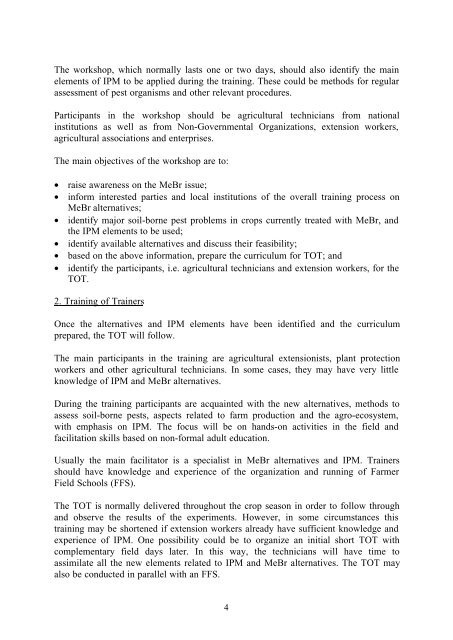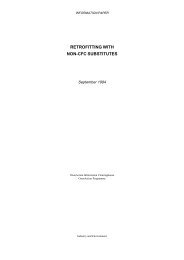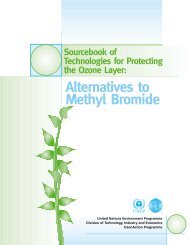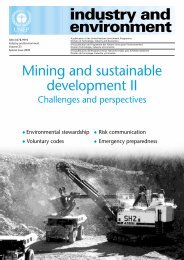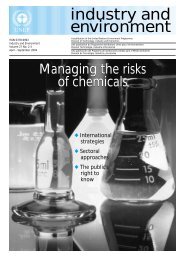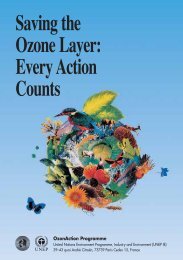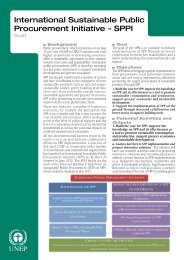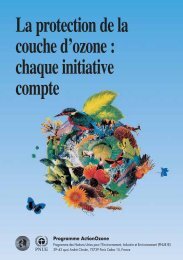Manual for Training of Extension Workers and Farmers on ... - DTIE
Manual for Training of Extension Workers and Farmers on ... - DTIE
Manual for Training of Extension Workers and Farmers on ... - DTIE
You also want an ePaper? Increase the reach of your titles
YUMPU automatically turns print PDFs into web optimized ePapers that Google loves.
The workshop, which normally lasts <strong>on</strong>e or two days, should also identify the main<br />
elements <str<strong>on</strong>g>of</str<strong>on</strong>g> IPM to be applied during the training. These could be methods <str<strong>on</strong>g>for</str<strong>on</strong>g> regular<br />
assessment <str<strong>on</strong>g>of</str<strong>on</strong>g> pest organisms <str<strong>on</strong>g>and</str<strong>on</strong>g> other relevant procedures.<br />
Participants in the workshop should be agricultural technicians from nati<strong>on</strong>al<br />
instituti<strong>on</strong>s as well as from N<strong>on</strong>-Governmental Organizati<strong>on</strong>s, extensi<strong>on</strong> workers,<br />
agricultural associati<strong>on</strong>s <str<strong>on</strong>g>and</str<strong>on</strong>g> enterprises.<br />
The main objectives <str<strong>on</strong>g>of</str<strong>on</strong>g> the workshop are to:<br />
• raise awareness <strong>on</strong> the MeBr issue;<br />
• in<str<strong>on</strong>g>for</str<strong>on</strong>g>m interested parties <str<strong>on</strong>g>and</str<strong>on</strong>g> local instituti<strong>on</strong>s <str<strong>on</strong>g>of</str<strong>on</strong>g> the overall training process <strong>on</strong><br />
MeBr alternatives;<br />
• identify major soil-borne pest problems in crops currently treated with MeBr, <str<strong>on</strong>g>and</str<strong>on</strong>g><br />
the IPM elements to be used;<br />
• identify available alternatives <str<strong>on</strong>g>and</str<strong>on</strong>g> discuss their feasibility;<br />
• based <strong>on</strong> the above in<str<strong>on</strong>g>for</str<strong>on</strong>g>mati<strong>on</strong>, prepare the curriculum <str<strong>on</strong>g>for</str<strong>on</strong>g> TOT; <str<strong>on</strong>g>and</str<strong>on</strong>g><br />
• identify the participants, i.e. agricultural technicians <str<strong>on</strong>g>and</str<strong>on</strong>g> extensi<strong>on</strong> workers, <str<strong>on</strong>g>for</str<strong>on</strong>g> the<br />
TOT.<br />
2. <str<strong>on</strong>g>Training</str<strong>on</strong>g> <str<strong>on</strong>g>of</str<strong>on</strong>g> Trainers<br />
Once the alternatives <str<strong>on</strong>g>and</str<strong>on</strong>g> IPM elements have been identified <str<strong>on</strong>g>and</str<strong>on</strong>g> the curriculum<br />
prepared, the TOT will follow.<br />
The main participants in the training are agricultural extensi<strong>on</strong>ists, plant protecti<strong>on</strong><br />
workers <str<strong>on</strong>g>and</str<strong>on</strong>g> other agricultural technicians. In some cases, they may have very little<br />
knowledge <str<strong>on</strong>g>of</str<strong>on</strong>g> IPM <str<strong>on</strong>g>and</str<strong>on</strong>g> MeBr alternatives.<br />
During the training participants are acquainted with the new alternatives, methods to<br />
assess soil-borne pests, aspects related to farm producti<strong>on</strong> <str<strong>on</strong>g>and</str<strong>on</strong>g> the agro-ecosystem,<br />
with emphasis <strong>on</strong> IPM. The focus will be <strong>on</strong> h<str<strong>on</strong>g>and</str<strong>on</strong>g>s-<strong>on</strong> activities in the field <str<strong>on</strong>g>and</str<strong>on</strong>g><br />
facilitati<strong>on</strong> skills based <strong>on</strong> n<strong>on</strong>-<str<strong>on</strong>g>for</str<strong>on</strong>g>mal adult educati<strong>on</strong>.<br />
Usually the main facilitator is a specialist in MeBr alternatives <str<strong>on</strong>g>and</str<strong>on</strong>g> IPM. Trainers<br />
should have knowledge <str<strong>on</strong>g>and</str<strong>on</strong>g> experience <str<strong>on</strong>g>of</str<strong>on</strong>g> the organizati<strong>on</strong> <str<strong>on</strong>g>and</str<strong>on</strong>g> running <str<strong>on</strong>g>of</str<strong>on</strong>g> Farmer<br />
Field Schools (FFS).<br />
The TOT is normally delivered throughout the crop seas<strong>on</strong> in order to follow through<br />
<str<strong>on</strong>g>and</str<strong>on</strong>g> observe the results <str<strong>on</strong>g>of</str<strong>on</strong>g> the experiments. However, in some circumstances this<br />
training may be shortened if extensi<strong>on</strong> workers already have sufficient knowledge <str<strong>on</strong>g>and</str<strong>on</strong>g><br />
experience <str<strong>on</strong>g>of</str<strong>on</strong>g> IPM. One possibility could be to organize an initial short TOT with<br />
complementary field days later. In this way, the technicians will have time to<br />
assimilate all the new elements related to IPM <str<strong>on</strong>g>and</str<strong>on</strong>g> MeBr alternatives. The TOT may<br />
also be c<strong>on</strong>ducted in parallel with an FFS.<br />
4


